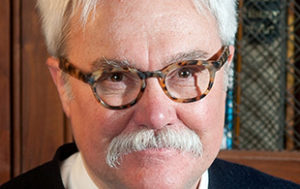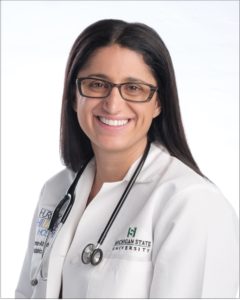Bill Peak is the Communications Manager and all-encompassing “Library Guy” at the Talbot County Free Library on Maryland’s Eastern Shore. He is the author of the novel The Oblate’s Confession (2014). Bill writes a monthly article for The Star-Democrat about working at the Talbot County Free Library. Here, he reviews What the Eyes Don’t See: A Story of Crisis, Hope, and Resilience in an American City by Mona Hanna-Attisha, our 2019 One Maryland One Book selection.
Dr. Hanna-Attisha will tour Maryland in November. She will be in conversation with Mr. Peak for her stop at Chesapeake College on November 4. One Maryland One Book events will occur throughout November. This essay was originally published in The Star-Democrat on July 28, 2019.

Imagine a land where the leader of the state doesn’t like the way one of his cities is being run. Rather than try to persuade the town’s people to choose leaders that will take them in the direction he believes they should go, he takes away the city’s right to govern itself and replaces it with an “administrator” of his own choosing, one who will answer to him rather than the people themselves.
This new, unelected administrator, in order to please the leader and reduce the state’s share of the money required to run and maintain an urban area of such size, unilaterally orders the city to cease drawing its water from a reliable, clean source, and, instead, pull it at little cost from the visibly polluted river that runs through the middle of town.
Almost immediately citizens begin to complain that the water tastes bad, that it’s discolored, that bathing in it causes rashes and worse … but the various city and state ministries entrusted with protecting the citizens’ health, seeing where the real power lies, manipulate the tests they run on the water so they can claim it is safe. This despite the fact those tests are, in truth, showing that the water is not only bad, it contains a poison that severely impairs the mental development of the city’s children.
Now you can quit imagining because, as you may have guessed, this is a true story … and it is a true story that took place not in some third-world nation but in America—Flint, Michigan, to be exact, the town that grew up around the manufacture of that most quintessential of American possessions: the automobile. But, thankfully, as in any good American story, an unassuming hero strode out of the gloom and doom to take on the city administrator and his state and federal accomplices and, ultimately, carry the day.

In the summer of 2015, Dr. Mona Hanna-Attisha was a young pediatrician at Flint’s Hurley Medical Center. Hurley is a public hospital and, being a public servant herself, one who had been raised upon the promises of the American Dream, Hanna-Attisha had great faith in the American system and the authorities empowered to watch over it. When the health department and the state’s environmental quality department assured the public that the water was safe, she believed them. And, believing them, she told the parents of her young patients they had nothing to fear, that they could safely let their children drink Flint’s tap water. Then, in August, she had an old high school buddy over for barbecue, a friend who happened to be an environmental engineer.
This year’s One Maryland One Book, “What the Eyes Don’t See,” tells the story of what happened as a result of that chance invitation. The high school friend told Hanna-Attisha the water wasn’t safe, that, indeed, it was so corrosive General Motors had received a special waiver to draw its water from the original source, so as to keep the Flint water from corroding the company’s machinery. If it was corroding GM’s auto parts, imagine what it was doing to the city water system’s lead pipes, to say nothing of the tender tissues of its citizens.
One Maryland One Book is the Maryland Humanities program in which people all across the state read the same book at the same time, and this year’s selection tells the true story of how Dr. Hanna-Attisha took on an array of intransigent state and federal bureaucracies and, incredibly, prevailed. At a time when many claim that government workers are little more than lazy freeloaders, it’s nice to be reminded that hard-working, responsible public servants like Dr. Hanna-Attisha not only exist, they often are the only things standing between the people and disaster.
“What the Eyes Don’t See” is a great “the good guys win, the bad guys not only lose, they receive their just deserts” story. We all need our heroes, and I will readily admit that the diminutive, humble, dedicated Dr. Mona Hanna-Attisha is now one of mine. On Tuesday, September 17, at three o’clock, in our St. Michaels branch, and again on Monday, September 23, at six o’clock, in our Easton branch, I will lead a discussion of this year’s One Maryland One Book: “What the Eyes Don’t See.” I invite you to come talk with me about a book I’m pretty sure you’re going to love.
Disclaimer: The views and opinions expressed on our blog do not necessarily reflect the views or position of Maryland Humanities or our funders.

